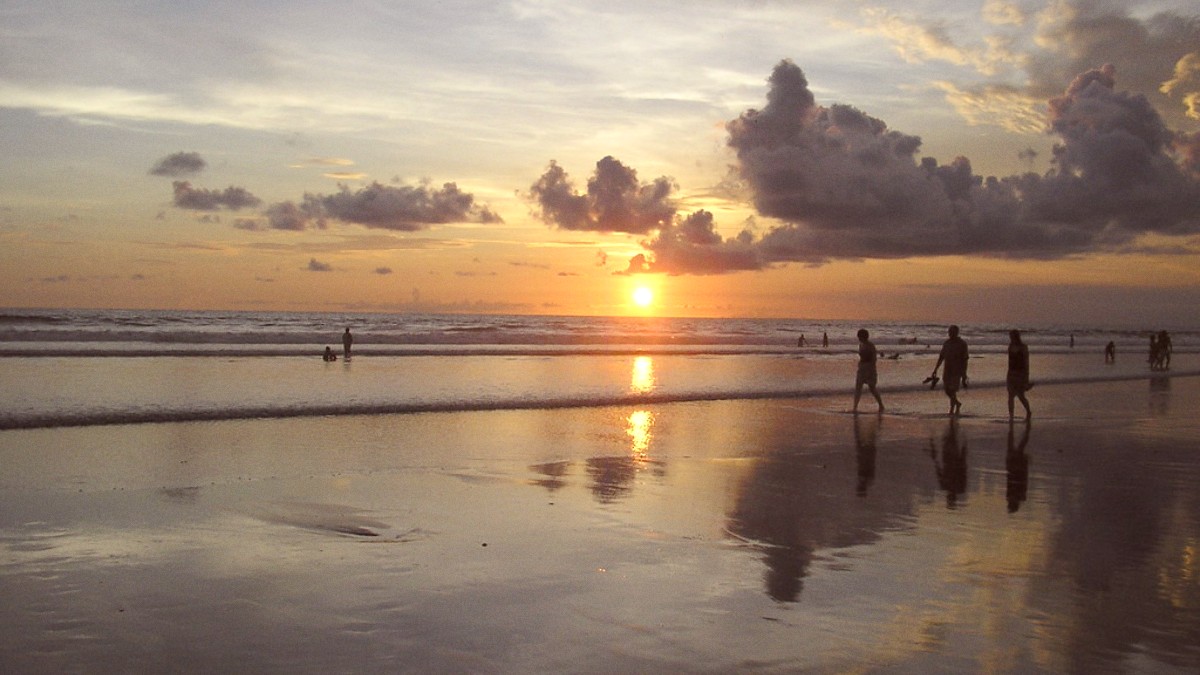
Indonesia
Seminyak has two distinct seasons: Dry Season (April to October) brings less humidity, abundant sunshine, and significantly lower rainfall. Skies are generally clear, creating perfect conditions for photography and outdoor adventures.
Wet Season (November to March) means higher humidity and more frequent rainfall. These rains usually come as short, heavy tropical downpours, often in the late afternoon or evening, rather than prolonged, continuous rain. Mornings often remain sunny. Temperatures during the wet season are typically a bit warmer.
Seminyak is outside typical hurricane or cyclone paths. Monsoons bring heavy, short tropical rains, not continuous downpours.
Extreme temperatures are rare; variations typically stay within a narrow tropical range.
Ideal for beach activities and consistent waves.
Dry season (April-October) offers consistent waves for experienced surfers.
Higher prices and larger crowds.
Fewer crowds, good weather balance.
Enjoy agreeable weather with manageable tourist numbers.
Slight chance of rain, especially in April and October.
Excellent for budget-conscious travelers, lush scenery.
Lowest prices for flights and accommodation.
Higher chances of rain and humidity. Some smaller businesses may have reduced hours.
Citizens from specific ASEAN countries enter Indonesia without a visa for up to 30 days. Over 90 countries qualify for a Visa-on-Arrival (VoA) costing IDR 500,000 for a 30-day stay, extendable once. An e-VoA is available online through the official Molina Immigration portal. For stays over 60 days, a B211A visa requires sponsorship and application before travel.
Your passport must be valid for at least 6 months from entry. Carry proof of onward or return ticket. Immigration officials may ask for evidence of funds. The VoA payment fee applies. A sponsor letter and other documents are necessary for a B211A visa.
Payable in Rupiah or major foreign currencies, credit cards accepted.
Complete the ECD online before arrival via the official Electronic Customs Declaration portal.
Passports stamped upon arrival. Follow instructions, be patient.
No specific permits for general tourism. Remote areas or professional photography might have local fees.
No mandatory vaccinations for entry. Consult your doctor for personalized health advice.
Managing your budget in Seminyak is straightforward once you understand the local currency and typical costs. Bali presents experiences for every budget, from very economical to ultra-luxury.
The official currency is the Indonesian Rupiah (IDR). Prices often use 'Rp' or 'IDR'. Exchange rate (approx. As of 2024): 1 USD ≈ IDR 16,000; 1 EUR ≈ IDR 17,500. Rates fluctuate, check current rates.
This breakdown gives a general guideline. Your actual costs vary based on preferences, activities, and current rates.
Here are common price ranges for various items, guiding your budget.
While Bali is generally a safe destination, awareness and preparation assist your well-being.
Ensure routine vaccinations (MMR, DTP, Varicella, Polio, Flu) are current.
Recommended due to potential exposure through food/water or body fluids. Consult your doctor for personalized advice.
Typhoid recommended for eating outside major establishments. Rabies for long-term travelers or animal interaction.
Traveler's Diarrhea
Drink only Bottled water. Avoid ice unless purified. Be cautious with raw salads.
Carry Anti-diarrheal medication like Imodium A-D Caplets. Rehydration salts are helpful.
Dengue Fever. Use Insect repellent with DEET or Picaridin (e.g., REPEL Plant-Based Lemon Eucalyptus Insect Repellent). Wear long sleeves/pants dawn/dusk.
BIMC Hospital Kuta (International Medical Centre) is reputable for tourists. Siloam Hospitals Denpasar offers comprehensive services. Smaller clinics and pharmacies (Apotek) are widely available.
Tap water is not safe. Only drink bottled water. Accommodations often Provide free bottled water daily. A Water filter bottle can reduce plastic waste.
Good hygiene in established restaurants. For street food, choose busy places with fresh, cooked food. Observe cleanliness.
Seminyak is generally safe for tourists. Petty crime occurs. Awareness limits issues.
Keep emergency contact information accessible, perhaps on your phone and a physical card.
Police: 110, Ambulance: 118, Fire Department: 113. General Emergency: 112.
Travel insurance is highly recommended. It safeguards against unforeseen circumstances. The policy should cover medical emergencies, emergency evacuation, trip cancellation/interruption, and theft. Consider World Nomads, SafetyWing, or Insubuy.
Locate your country's embassy in Jakarta or consulate in Bali. Keep their contact details. Inform family or friends of your itinerary and provide them with your emergency contacts.